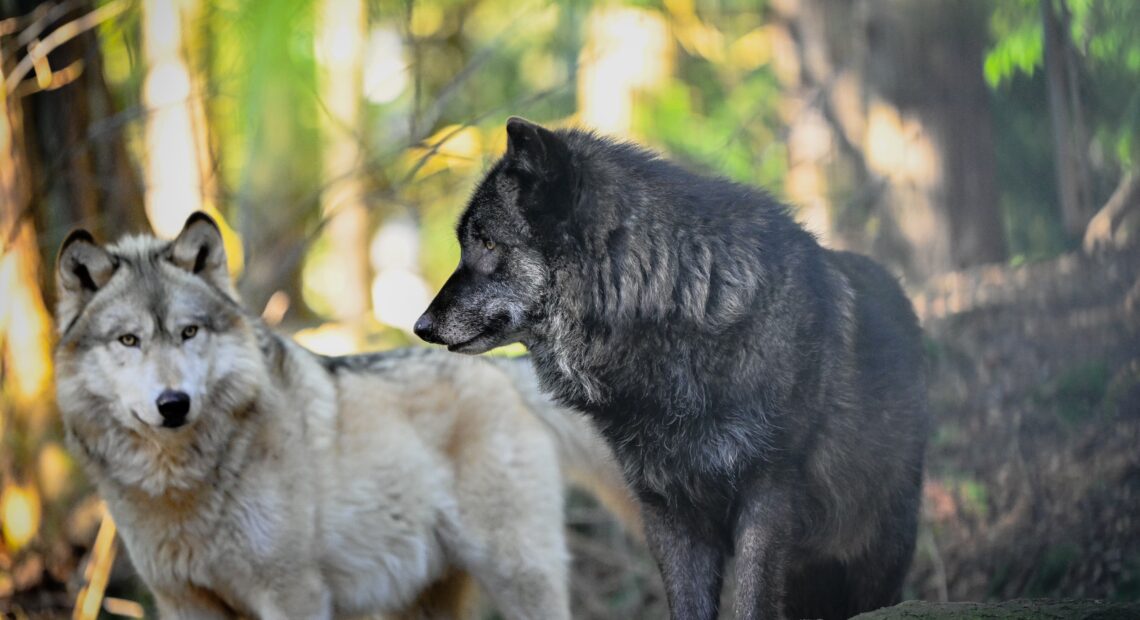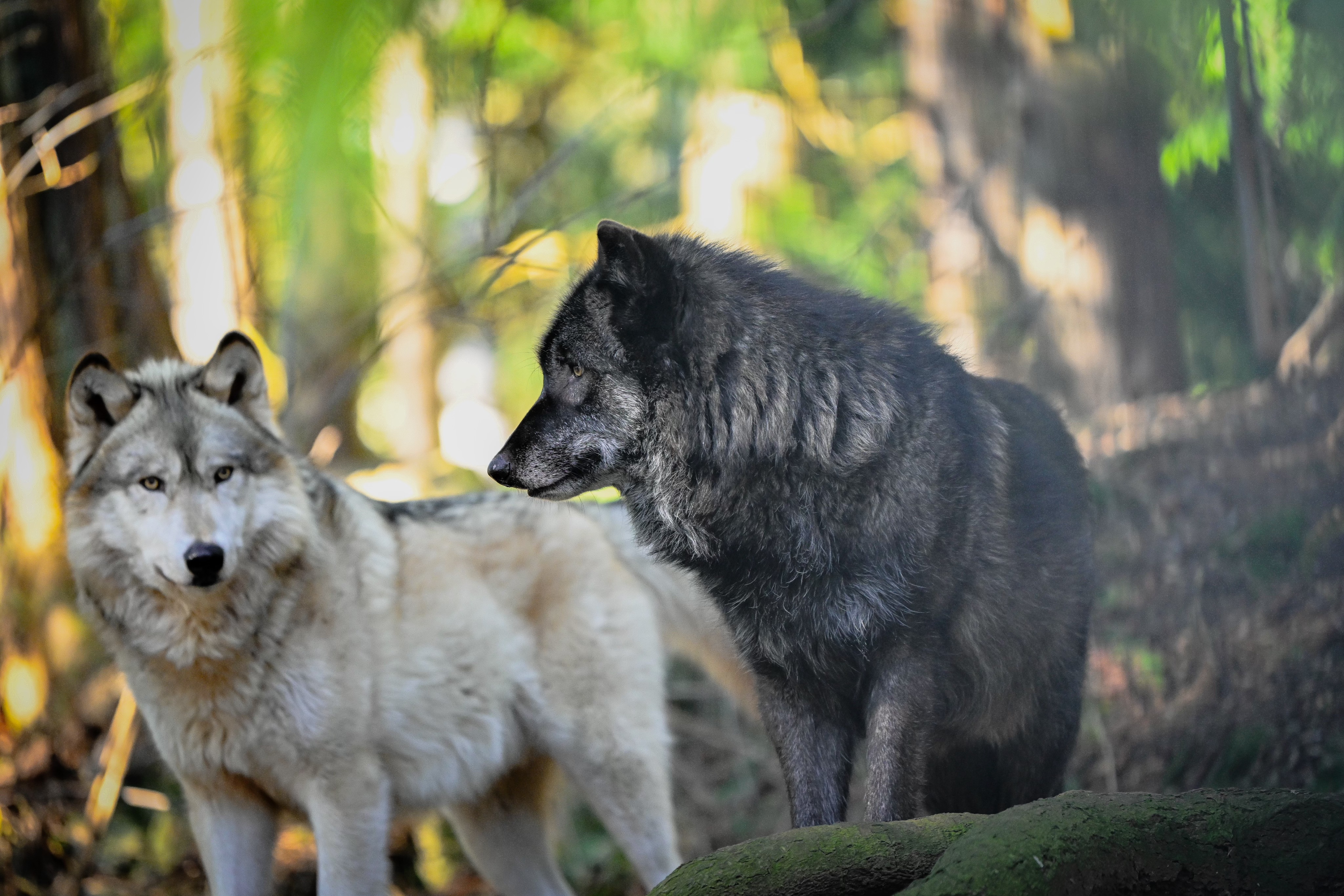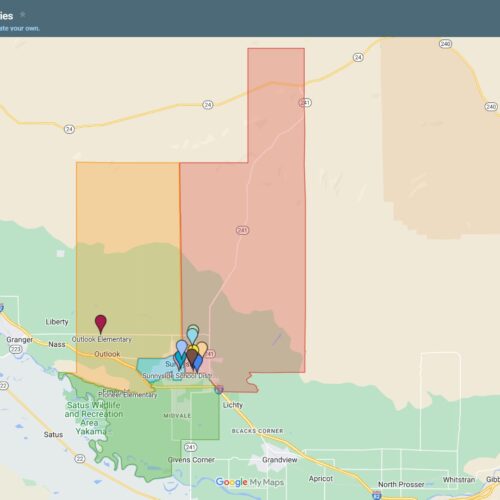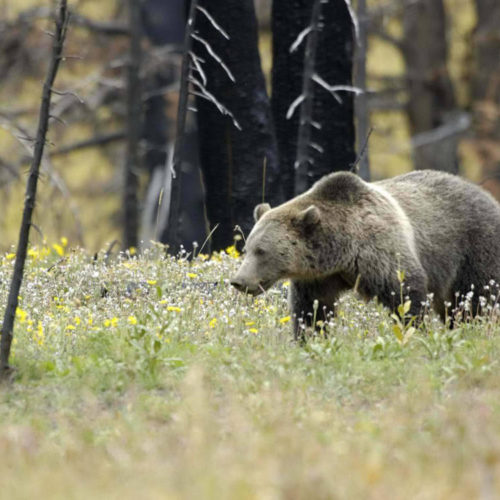
Nonprofit for exotic animals in Anacortes could be forced to close
Listen
(Runtime 1:02)
Read
Whether an organization housing a variety of animals in Anacortes, Washington will continue operating is in the hands of the Skagit County Board of Commissioners — with a decision expected Dec. 12.
The nonprofit, Predators of the Heart, is appealing an October decision by the Skagit County hearing examiner denying POTH a special use permit to continue operations with animals the county restricts under its “potentially dangerous animals” law. The Skagit County Board of Commissioners will decide on the appeal.
The facility houses animals like a porcupine, a bobcat, a South American Coati, rabbits, opossums and cougars – amongst a variety of others including 15 animals listed as wolf-dog hybrids.
The decision made by the board could have one of three outcomes. If commissioners agree with the hearing examiner’s decision to deny the permit, the facility will not have a permit to continue operations. If the board disagrees with the hearing examiner’s decision, they can remand the decision back to the hearing examiner, or the commissioners can issue a new decision.
If the facility does not get the special use permit, Ashley Carr, POTH’s executive director, said POTH will not be able to operate small group private tours. She said the facility uses those tours to make money to support the animals and staff. Without the tours, Carr said the facility may have to shut down. Predators of the Heart charges $200 for the small group private tours, offered through Airbnb.
In her opinion, some of the animals at the facility would not be able to be rehomed and she said she would have to euthanize possibly 60% of the animals. Because of ongoing litigation, Carr said she could not comment on specifics of which animals she believes would have to be euthanized were the operation to close.
Others argue that there are options besides euthanasia for a majority of the animals.
According to the most recent United States Department of Agriculture Animal and Plant Health Inspection Service (APHIS) inspection report from Oct. 18, Predators of the Heart houses 61 animals.
POTH has been operating in Anacortes since 2001 as a self-identified animal sanctuary and preserve. However, neighbors, animal rights groups and even former Anacortes mayor, Laurie Gere, have expressed concern about the way the organization operates including its treatment of animals and handling of animal escapes.
Carr said she has made changes since becoming president of POTH in 2020 after former president Dave Coleburn was fired.
The case has gotten a fair amount of media coverage and led to numerous debates on social media. Carr said she thinks there is a lot of misunderstanding, “That one Netflix documentary has put a bad taste in everyone’s mouth, about people and animal ownership and all of that,” she said, referring to Tiger King, a 2020 documentary series about roadside zoos and the underground world of big cat breeding.
Why has the group been denied the permit so far?
Skagit County hearing examiner Alex Sidles issued his decision on the special use permit on Oct. 2. He said the applicant is keeping potentially dangerous wild animals without meeting any exceptions listed in county code, making POTH ineligible for the permit.
There are exceptions in the county code that would allow for an organization to house outlawed, potentially dangerous animals – including written requests from animal control or a similar agency, for the keeping of the animals, being a wildlife sanctuary or exhibiting animals at a fair.
In his decision, Sidles argued that the organization does not meet any of those exceptions. While Predators of the Heart was able to produce animal control requests for some of its animals, Sidles said that does not open the door for any animal at the facility.
“Otherwise, an organization could arrange to take in a single rescued parakeet (or other similarly innocuous animal) and use the parakeet as a fig leaf to bring in an unlimited number of dangerous animals that did not need rescuing in the first place,” Sidles wrote.
Sidles also argued that Predators of the Heart is not a wildlife sanctuary. He said the wolf-dog hybrids at the facility are not docile pets whose natural inclination is to be petted. He argued that Predators of the Heart uses them for commercial activity where they allow human interaction with the animals.
On tours, humans are allowed to go into the wolf-dog enclosures. According to recent statements in the permit decision appeal hearing made by the attorney for Predators of the Heart, if the animal is inclined, pet it. Sidles said these factors disqualify it as a sanctuary. The USDA has previously cited POTH for allowing direct contact between humans and wolf-dogs.
Whether the animals at Predators of the Heart are classified as wolf-dog hybrids or wolves has been contested during the permit hearing. The most recent USDA inspection report lists 15 wolf-dog hybrids at the facility. Under Skagit County law, wolf-dogs are deemed potentially dangerous animals. Predators of the Heart would need to meet the exceptions for housing these animals to qualify for a special use permit.
The facility does not meet the exception for fair exhibitors, Sidles wrote, as the organization would need to be actively displaying animals at a fair. The organization has a class A exhibitor permit through the USDA APHIS but, Sidles wrote, that is not enough.
“Every escape from the Applicant’s facility has happened on USDA’s watch. USDA’s supervision is not tight enough to prevent this Applicant from endangering its community. It is time to call in additional expertise,” Sidles wrote.
NWPB reached out to media representatives at USDA APHIS and received no response.
What is Predators of the Heart?
POTH was started in 1998 by Dave Coleburn, who is Ashley Carr’s father. Coleburn was terminated from his position as president by the Predators of the Heart board in 2020 after facing numerous complaints, lawsuits and violations at the facility. Carr began calling the organization Because We Matter Exotic Animal Rescue earlier this year.
In January 2022, Carr said the organization received a letter from Skagit County informing them they would need to apply for a special use permit and shut down beginning Feb. 1, 2022 until a permit decision was made. It hasn’t been operating tours since.
“I think the biggest thing is that people don’t understand that I’m making up for a lot of the previous president’s sins,” Carr said.
Carr said she would be fine not doing the tours and solely operating as a rescue. However, she said the tours bring in money to support operations. Statements provided by the attorney representing Predators of the Heart and Carr affirm that the organization does want to bring back the tours.
The facility sits in rural reserve land, adjacent to Anacortes Community Forest Lands.
What is the community’s reaction?
Since being shut down, the organization has received a number of donations through crowd-sourcing sites and social media.
Carr said she cannot share the total amount her organization has received in donations. She said it costs $50,000 every month to care for the animals.
A group of neighbors is against the county granting Predators of the Heart a special use permit. The group is currently suing POTH, and is represented by David Perez with Perkins Coie.
“They’ve maintained their operations, frankly, illegally for two decades,” Perez said.
The neighbors are long-time residents of Anacortes, Perez said, who are fed up.
“The county has had the ability to shut them down for decades and the county has not done so,” Perez said.
There have been multiple escapes of animals from the property including the most recent instance in 2021 when three wolf-dogs or wolves escaped and killed a neighbor’s chihuahua. The dog owner was paid $50,000 in damages, Carr said. The USDA gave Predators of the Heart a critical citation for the incident and had to comply with a re-license inspection. The nearby community forest lands were closed when the city became aware of the incident.
The former mayor of Anacortes, Laurie Gere, sent a letter requesting the facility cease all operations in October 2021.
“If Predators [of the Heart] truly cared about the animals, it would shut down and work really hard to rehome these animals,” Perez said. If the facility wants to be a sanctuary, they should seek accreditation through an organization such as Global Federation of Animal Sanctuaries (GFAS) or the American Zoo Association, Perez said.
Carr said she has sought accreditation from GFAS but said they denied her an opportunity to apply.
“I don’t want to be a part of an organization that forms opinions without even coming out and inspecting,” Carr said.
NWPB received a response from GFAS that POTH is not accredited through them and that GFAS cannot release information about facilities that may or may not have begun the process until they receive accreditation.
In hearings, Carr stated that her organization could not meet GFAS accreditation for space.
“I know that it may not be the standard of GFAS,” Carr said in reference to having only the USDA license. Carr said there also needs to be more support for the government agencies that do this kind of work to make inspections happen more often.
Kelly Donithan, director of the global animal disaster response program with The Humane Society, provided expert testimony in the case against Predators of the Heart. Donithan expressed concerns about the standards of the USDA license. One is a disparity between the number of inspectors and licensed facilities to inspect.
“So there’s a huge amount of work placed on the inspectors in their ability to thoroughly inspect and follow up on every facility is a challenge, because there’s just such a large workload,” Donithan said.
Donithan said her organization has seen facilities receive multiple violations from the USDA with little follow-up which, she said, might mean impacts to animal welfare.
The USDA recently changed its policy to have the exhibitor licenses last for three years as opposed to one year.
“A lot can happen during that time where animals are not being properly cared for,” Donithan said.
If Predators of the Heart is shut down, what would happen to the animals?
Carr has said on multiple occasions that the closure of the facility would mean many of the animals at POTH would not be able to be rehomed and would have to be euthanized. She said the decision to euthanize animals would be based on a number of factors including age and health.
“We have contingency plans for the animals that can be rehomed but I have a lot of geriatric patients that cannot be transported safely,” Carr said.
“That is not a decision that comes lightly,” Carr said. “If I can rehome it, I will, I’m not going to euthanize animals just because if I can’t have them, no one can —that’s not even it.”
Considerations about rehoming are made on a case by case basis to best suit the animal’s needs, Donithan said.
“I don’t know some of the details of her particular animals but in my experience that would not be, it wouldn’t be an automatic factor that they would have to be euthanized,” Donithan said, speaking to age and medical concerns. “Now, if they had significant health concerns, in which case, euthanasia, regardless of whether or not they moved, was the most humane option, then that would be a different situation.”
Groups such as the Animal Legal Defense Fund disagree with the premise that so many animals would have to be euthanized. Danny Waltz is an attorney for the ALDF.
“We’re connected with a number of sanctuaries that would be able to find housing, rehome opportunities for the wolves,” Waltz said.
Waltz said there are a number of regional sanctuaries that could take the animals.. Waltz and others have expressed concerns with past euthanasia of animals at the facility. In a recent hearing, Carr explained that in the last year, nine wolves were euthanized — Carr said this was due to previous poor care and age of the animals.
“It’s a false choice they hold up,” said Perez, the attorney representing the neighbor group. “Basically, you hold these animals hostage, ‘keep us running or we’ll kill them.’”
There are 11 sanctuaries in Washington that GFAS has accredited or verified. Wolf Haven International is the only GFAS accredited sanctuary in the state that takes canids like wolf-dogs.
Carr has raised an issue with organizations that have said they could assist in finding rehoming options. “When you have organizations that are animal activist groups come to you and say, ‘we do this,’ all they do is get on the phone and call people,” Carr said. “They don’t know, not all of them have been to facilities, not all of them know, really, the ins and outs, how sanctuary works.”
Carr said she doesn’t want to put her animals in a worse situation. Carr said it can be detrimental to an animal’s mental health to have them transported to another facility when they have worked with certain people and lived in one place for a long time. She said that transportation itself can put a big stress on animals.
“There are a lot of great sanctuaries out there,” Carr said. “But there are a lot of bad sanctuaries out there.”
Can they be rehomed?
Donithan, with the Humane Society, said there are a number of options when rehoming animals like these.
“Especially in the U.S., we are lucky enough to have a pretty good network of true sanctuaries throughout the U.S.,” Donithan said. “That is where we tend to focus our efforts because once the animals go into a true sanctuary, they’re there for their lifetime.”
The Humane Society has one sanctuary, Black Beauty Ranch in Texas, but often works with other sanctuaries around the U.S. to rehome animals when the facility they are living at is closing down. Many of the sanctuaries where they place animals are GFAS and/or American Zoo Association accredited or don’t have the accreditation but still meet those standards of care.
With a vast network of sanctuaries in the U.S., she said efforts are made to rehome the animal as closely as possible to lessen travel time.
“We’ve moved a lot of animals out of some pretty bad situations where they aren’t in perfect health but that has not been a limitation in getting them into a better situation,” Donithan said. “We’ve placed elderly animals into new facilities and they’ve thrived with that.”
There are a multitude of considerations to make when rehoming animals, said Dr. Marcie Logsdon, who is a veterinarian at the Washington State University Veterinary Teaching Hospital. She works in the Exotics and Wildlife Department.
“You would be looking at, from the animal’s point of view, will it do well in this new facility?” Logsdon said. “And then the flip side, from the facility’s point of view, is there a facility available that has the capacity and resources to take appropriate care of the animal?
Rehoming captive animals can be easier than wild-born animals, which is the type of rehabilitation work she sometimes has to do in her job. She said not knowing how an animal will do in a new environment and sanctuary space can be barriers to rehoming.
“Anytime that a facility that has a large number of animals is facing closure, these things usually don’t happen in a vacuum and there are definitely lots of other organizations that care for and care about these types of animals,” Logsdon said. She explained that those places can often step in and help with rehoming but can also get full quickly.
When asked about the possibility of having to euthanize animals, Logsdon said, “I have not been involved in any situations, personally, where they’ve had to resort to euthanasia but that is something that is a possible outcome if animals are not able to be rehomed or if they’re not a good candidate for rehoming.”
The decision to euthanize is not taken lightly, Logsdon said.
In regard to how medical conditions could impact an animal’s ability to be rehomed, Logsdon said if a condition is being effectively managed at one place, it could likely be managed elsewhere. Other factors, like whether a species is communal, and could face risks being moved into a new community, are also considered, Logsdon said.
Should Predators of the Heart be allowed to continue operating, Carr said she would like to further improve the organization — including a $2 million renovation.
“We’ve been doing this on this property for 21 years but I want to do it better and I want it to be safe and I want the community to feel safe,” Carr said.
If the permit is denied, Carr said her next step would be to appeal the decision in a higher court.
UPDATE 1/3: This story has been updated to clarify what the Skagit County permit would allow.
















